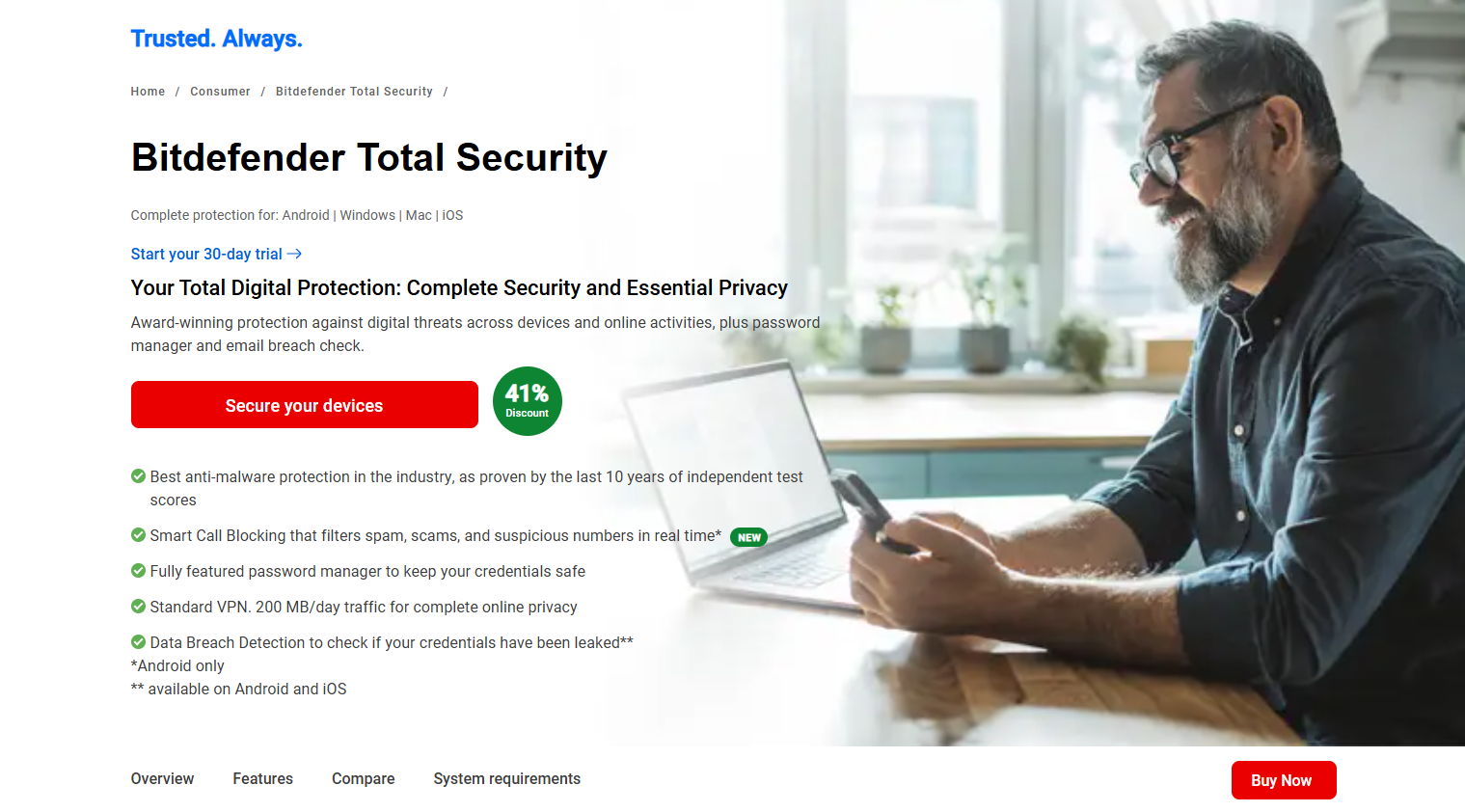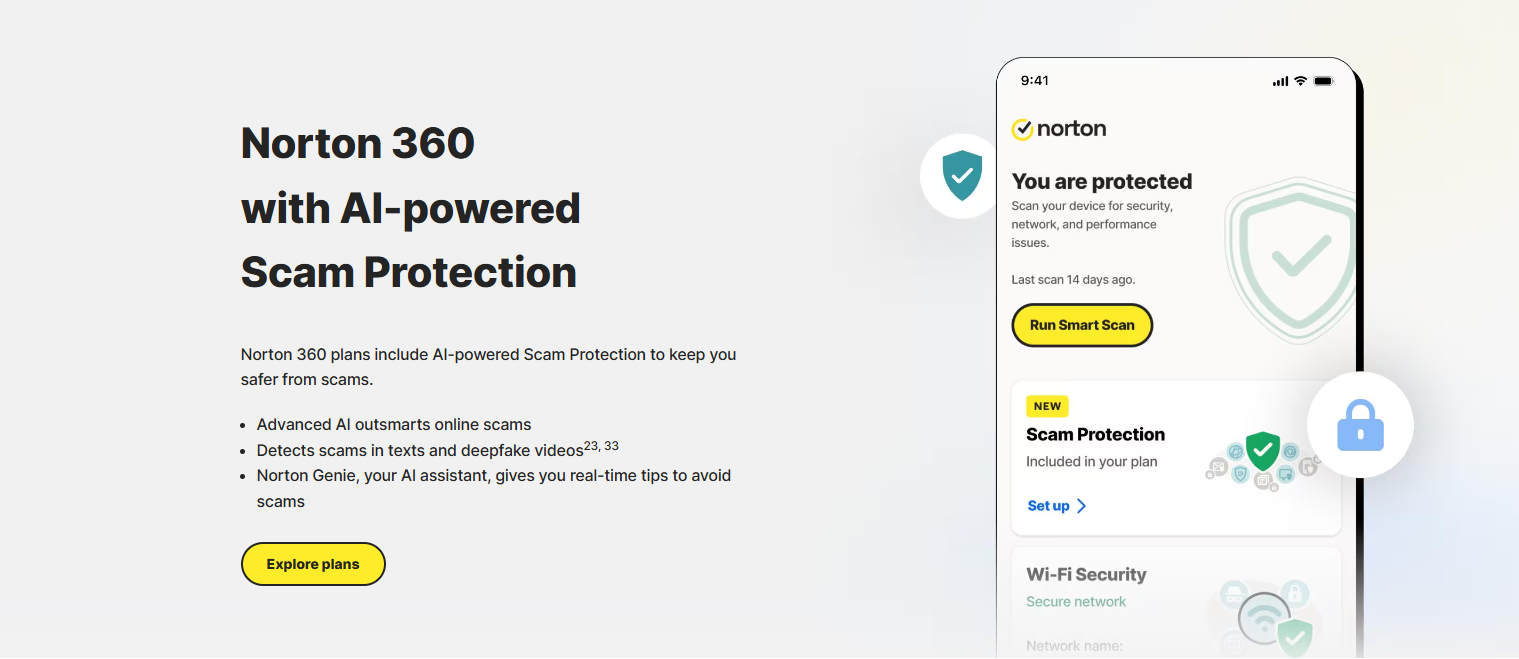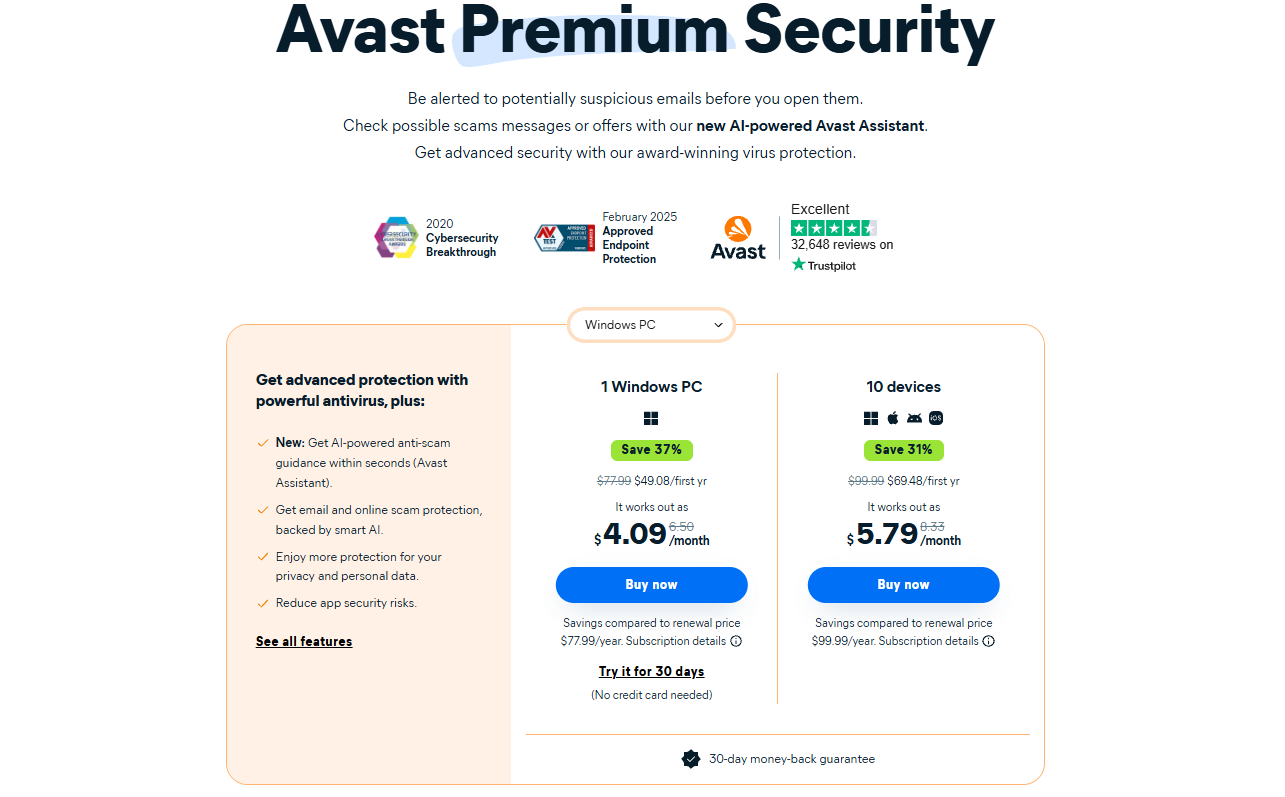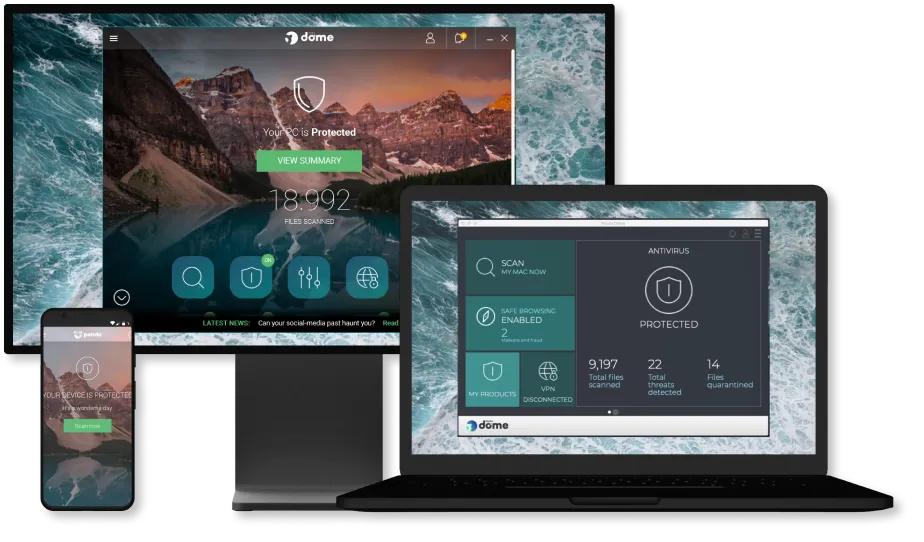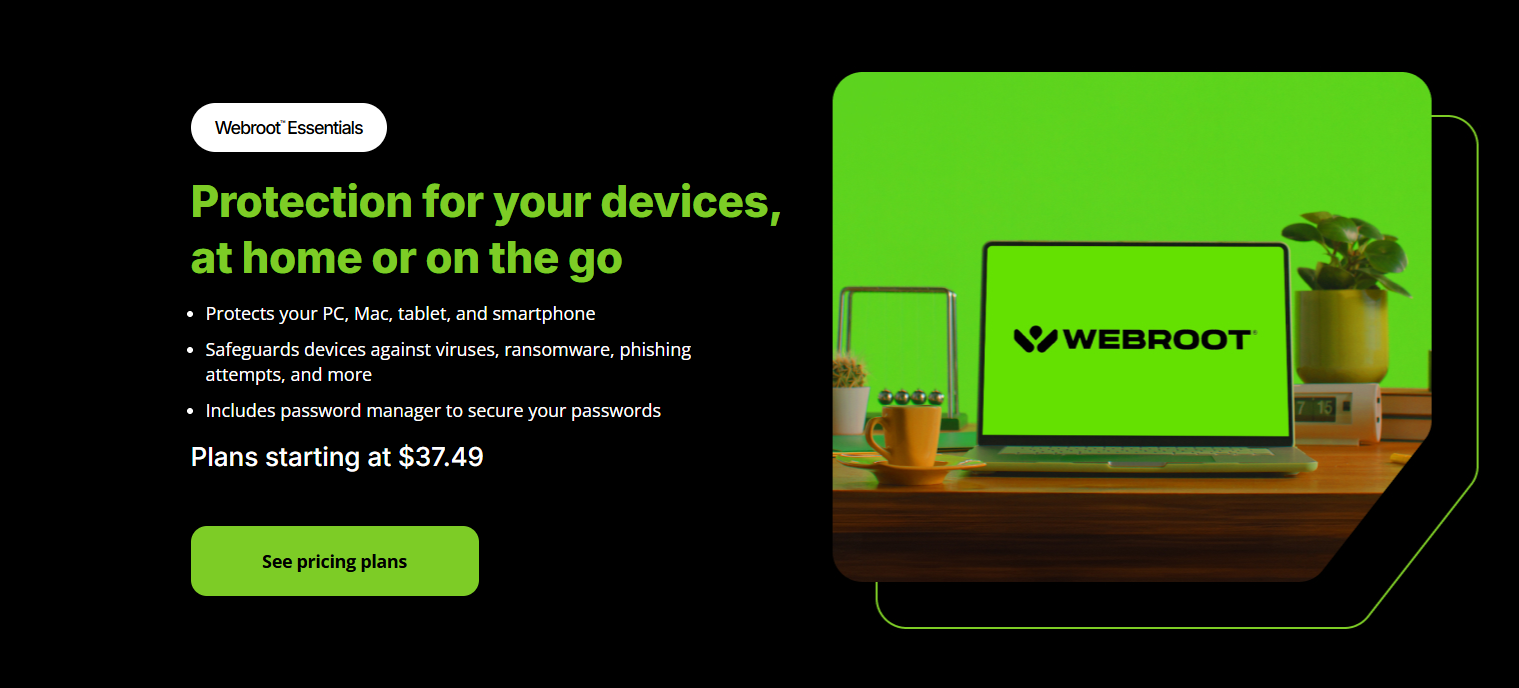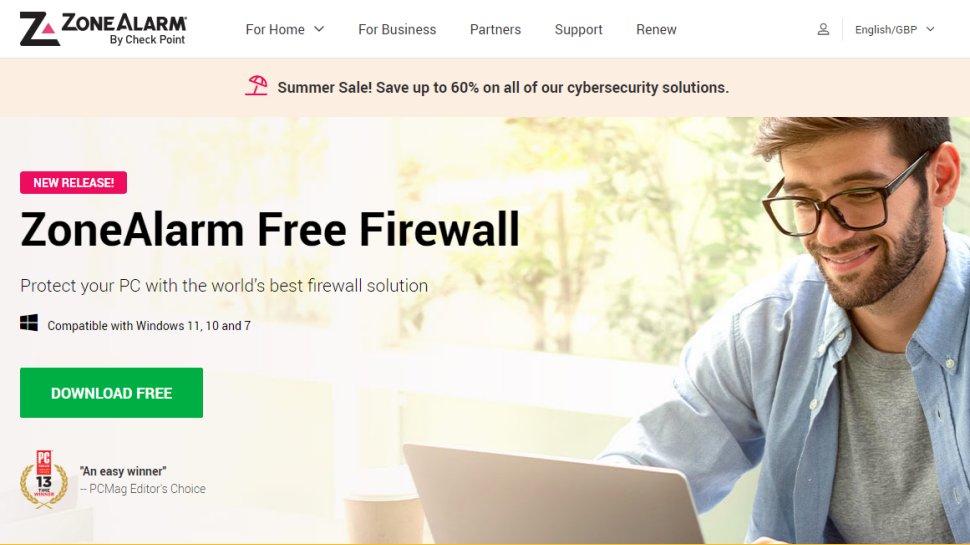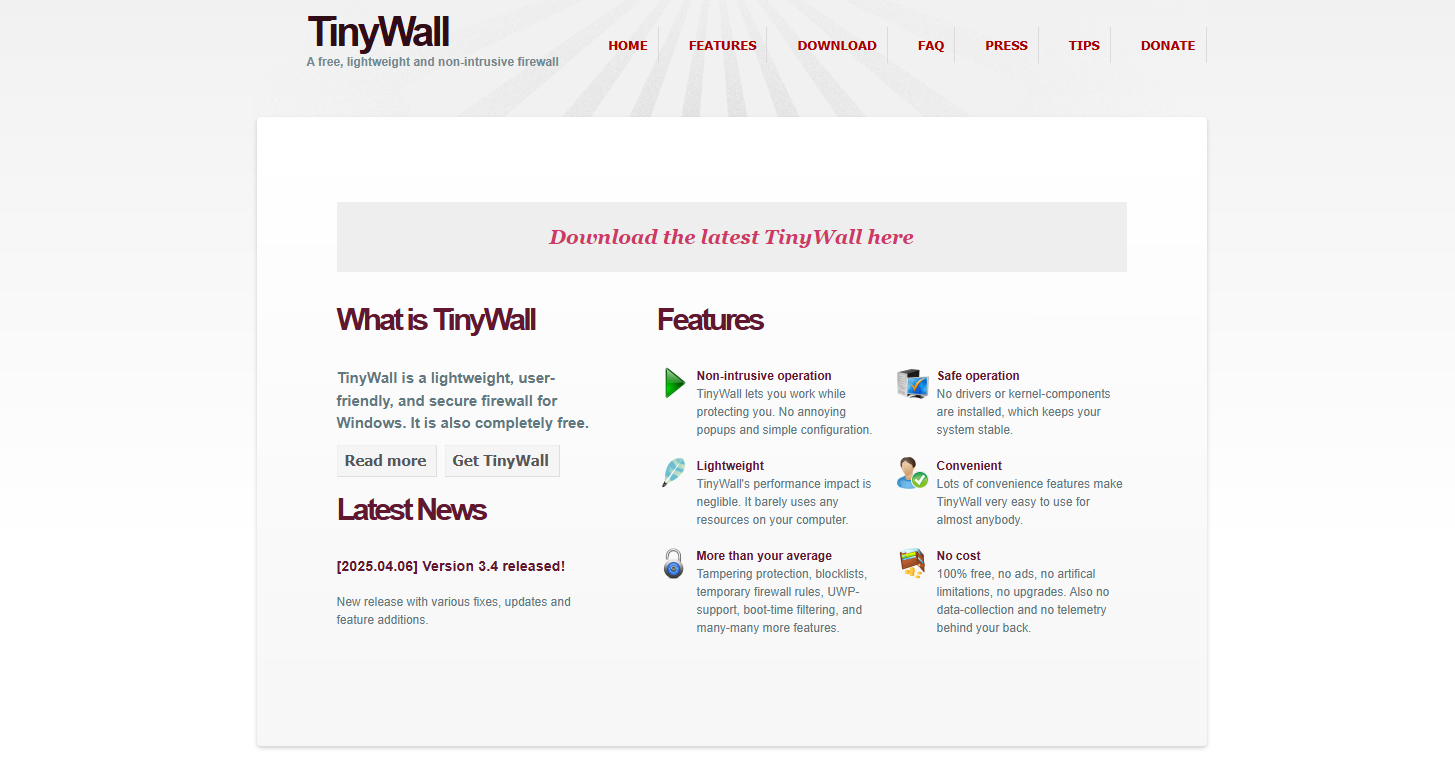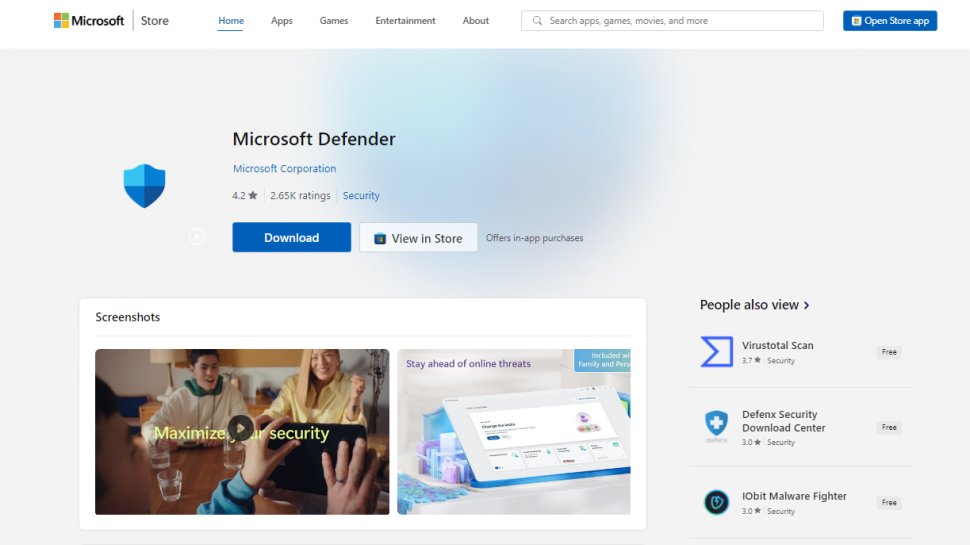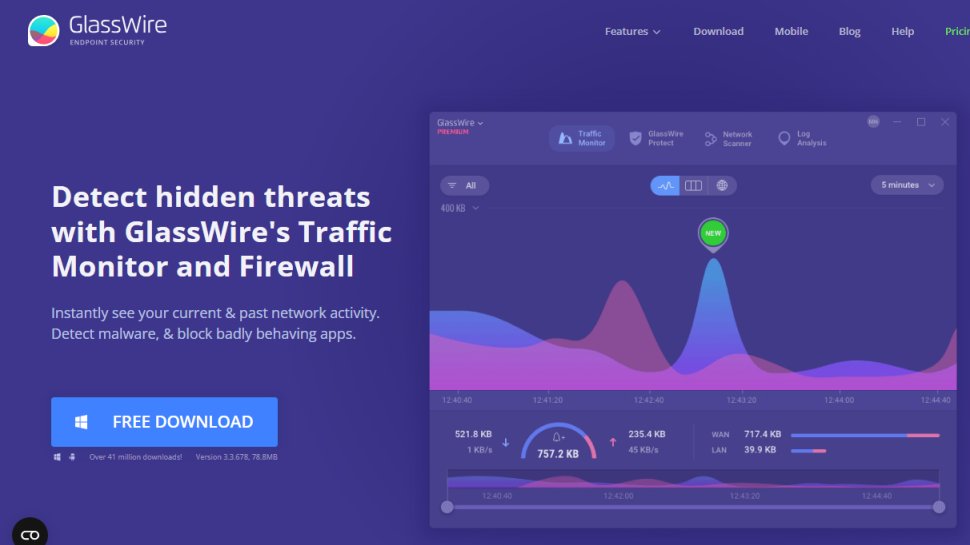Best Firewall Software of 2025: Top Picks Reviewed, Rated, and Ranked
The best firewall software to help you stay protected online

The best firewall software acts as a protective barrier between your device and its connection to the outside world, helping identify out malicious files traveling through your network.
My team of experts have been testing firewall software for over a decade, and during testing paid particular attention to detection rates, file blocking protocols, quarantine speed, ease of use, and value for money.
Bitdefender remains my top pick for the best firewall software, thanks to its excellent scoring in our own testing, and testing done by third-party laboratories. Norton and Avast also have excellent firewalls.
Firewalls work most effectively alongside the best antivirus software, and most of the options below come as a complete security package, complete with a VPN. I have also rounded up my top picks for the best cloud firewalls, as well as the best Linux firewall.
Reader Offer: Norton 360 Deluxe - Up to 58% Off (First Year)
Access to LifeLock identity protection services makes a Norton subscription worth every penny—but you'll also get strong protection against malware, browser security, parental controls, and even a password manager.
Techradar Pro Approved Sponsored Offer
The Best Firewall Software of 2025:
Why you can trust TechRadar
Best firewall software overall
Reasons to buy
Reasons to avoid
Bitdefender Total Security is a powerful internet security suite that offers a firewall among a range of featured security protections. There's also anti-virus protection, but its multi-layered malware protection also protects against ransomware.
Other features include anti-phishing, anti-fraud, and anti-theft options, as well as a performance optimizer. A wide range of privacy protection options include anti-tracking, file shredder, parental controls, as well as protection for microphones and webcams to prevent them from being used by third party apps without your consent. It also offers a built-in VPN with a reasonable limit of 200MB/day/device.
Bitdefender Total Security isn't just for protecting Windows users either, but can also be used to protect against attacks on Android, macOS, and iOS as well. Even better, a single product license allows you to use the software on up to 5 different devices, so you can use Bitdefender Total Security for your home PCs as well as smartphones.
Overall, Bitdefender Total Security pretty much does what its name suggests, offering a very wide range of security protections that go beyond just a firewall. It costs $59.99 when paid for a year or $129.99 when paid for two.
Protect your devices with our Bitdefender coupons. Get top-notch cybersecurity at a discounted price and keep your online activities safe.
Read our full Bitdefender Total Security review.
Best multi-feature firewall software
Reasons to buy
Reasons to avoid
Norton 360 Deluxe offers an even richer and more feature-packed internet security suite than just a firewall. While it provides antivirus and standard anti-malware protections it dares to go further.
Additional features in the Norton 360 Deluxe include a secure VPN, parental controls, a password manager (although you may want to use the best password manager instead), and online cloud backup. There's also a feature for dark web monitoring so you can be alerted if any of your details appear for sale on the dark web, and AI Scam Protection to keep you and your bank account safe from scammers.
Norton 360 Deluxe costs $49.99 for the first year, but then renews at $119.99/year, making it more expensive than some of the other solutions listed here, like Bitdefender Total Security. But just like Bitdefender Total Security, Norton 360 Deluxe runs on Windows, macOS, iOS, and Android, and a single license covers up to 5 devices in all.
If you want to add identity theft protection you can upgrade to Norton 360 with Lifelock, which provides additional identity protection and credit monitoring as well as an insurance provision in the event that your personal information is misused.
Read our full Norton 360 Deluxe review.
Best multi-platform firewall software
Reasons to buy
Reasons to avoid
Avast Premium Security is another paid-for full-featured internet security suite that you can either buy for a single device, be it Windows, macOS, iOS, or Android, or as a package that covers up to 10 devices, regardless of the platform.
As with Bitdefender, and Norton, this means that you can protect both a home PC as well as mobile devices. However, because there's an option to protect up to 10 devices it means you can use a single license to protect the family as well.
As well as a firewall for all devices, Avast Premium Security also provides anti-ransomware protection, and file shredder options. There are also anti-phishing and anti-fraud protections for safer online banking, and there's also protection against the unauthorized use of your webcam.
Overall, Avast Premium Security is another solid and reliable internet security suite, but one thing that does let it down is the constant pop-up ads pushing cross-sell for PC tune-up and other software, something people who have paid for a license should not have to constantly deal with.
Also, unlike some of its peers, Avast Premium Security doesn’t include a VPN, though it confusingly shows up in the dashboard, but requires a separate subscription.
For one device, Avast Premium Security costs $49.08/year for the first year, and renews at $77.99/year. For 10 devices, it costs $69.48/year for the first year, and $99.99/year for subsequent years.
Read our full Avast Premium Security review.
Best value firewall software
Reasons to buy
Reasons to avoid
Firewall, real-time malware detection, USB scanning, Wi-Fi protection, phishing protection: Panda Dome Essential has all the essentials – not to mention, the valuable extras – you'd expect from the best antivirus software.
And, that's just the beginning. Panda Dome is brimming with added extras that some of the other plans on this list can’t match including a dark web scanner, and an integrated VPN. However, it also lacks some features you’ll get with the other products in this guide. For instance, there are no parental controls, nor protection against ransomware that you get with the others.
Like its peers, Panda Dome Essential protects not just Windows PCs, but also macOS, as well as Android and iOS smartphones and tablets.
Another undoubted advantage here is the price - Panda Dome Essential is one of the best value programs out there. And, you even have the option of paying a little more and upgrading to cover an unlimited number of laptops, phones, tablets, and desktops with a single subscription.
For a single device, Panda Dome Essential costs $34.99/year, or $69.99 for two years. You can cover up to 3 devices for $41.99/year, 5 devices for $48.99, 10 devices for $69.99, or any number of devices for $83.99.
Read our full Panda Dome Essential review.
Best lightweight firewall software
Reasons to buy
Reasons to avoid
Just about every antivirus tool claims to be ‘lightweight’, but Webroot Essentials is really the only one to deliver on this front. It has a minimal impact on system resources, which makes it a good option for older or less powerful computers.
Webroot provides protection against a wide range of threats, including viruses, malware, ransomware, and phishing attacks. It also includes features like a firewall, and a password manager. But just like Panda Dome Essential, Webroot Essential also lacks a VPN, and parental controls.
It's not easy to compare Webroot's accuracy with the competition, as the big testing labs rarely evaluate the company's products. However, when they are reviewed, they generally score high, and our own tests show solid and reliable protection.
Another positive is that the product supports Windows, and macOS computers, as well as Android, and iOS smartphones and tablets. You can buy Webroot Essentials to protect either a single device, 3 devices, or 5 devices.
To protect 1 device you’ll have to pay $37.49 for 1 year, $43.74 for 2 years, or $45.83 for 3 years. Similarly, for 3 devices, it’ll cost $52.49 for 1 year, $61.24 for 2 years, and $64.16 for 3 years. The 5 device protection plan costs $67.49 for 1 year, $78.74 for 2 years, and $82.49 for 3 years.
There's a lot to love about Webroot Essentials, and the 70-day 100% money-back guarantee suggests the company is confident in the product as well. If you're sick of overly complex and bloated engines, Webroot is a worthy contender for you.
Find the best deals on Webroot products with our Webroot promo codes.
Best Free Firewall of 2025
Best free firewall software overall
Reasons to buy
Reasons to avoid
ZoneAlarm Free Antivirus, also known as ZoneAlarm Free Antivirus + Firewall, aims to provide more than basic malware protection. Positioned as a lightweight security suite for Windows users, it combines classic antivirus tools with firewall functionality and a handful of extra features.
At its core, ZoneAlarm offers antivirus and antispyware protection designed to detect a wide range of threats including viruses, bots, worms, and trojans. It offers two types of scans, namely Critical Scan, which is faster and only scans critical areas of the file system and OS, and the Full Scan, which combs through the entire file system on the local disk as well as on any attached USB devices.
It also features a two-way firewall that monitors traffic coming into and going out of your network, makes your PC invisible to hackers, and stops spyware from broadcasting your personal data.
ZoneAlarm comes in both Free and Pro versions. The former lacks several features, including expert rules, anti-phishing protection, web monitor, threat emulation, and more. What it will do is identify and block potentially unsafe traffic, hide open ports, and allow you to block any app from connecting to the internet.
Read our full ZoneAlarm review.
Best lightweight free firewall software
Reasons to buy
Reasons to avoid
TinyWall is actually designed to be used with Windows’ built-in Defender firewall, so its performance impact is minimal.
TinyWall will actively block trojans, viruses, worms, and other forms of malware, and prevent the modification of Windows firewall’s settings by malicious programs. And it will do all of this without you needing to know about ports, protocols, or application details.
But probably its most appealing feature is its no-popup approach. Most firewalls will display a popup asking you what you want to do whenever an application is trying to access the internet. Not only is this annoying, but eventually you’ll just start granting access to everything to get rid of the popups, which isn’t very secure.
TinyWall gets around this problem by expecting you to whitelist programs that you actually want to be able to access the Internet. When you find a program has been blocked, it’s easy to add it to the whitelist, and then you can continue with what you were doing.
Read our full TinyWall review.
Best basic free firewall software
Reasons to buy
Reasons to avoid
If you have a PC running a version of Windows more recent than XP, then you already have a free firewall installed, and unless you’ve changed any settings, it’s already active and running.
Known as Windows Defender since the release of Windows 10, the firewall is part of a suite of security tools included by default with Windows installations. Microsoft recommends that you leave the Defender on, even if you’re also using another firewall.
To manage its settings, simply search for 'security' in Windows and select the Security app. When it opens, set the Windows Defender Firewall toggle to on. Turning it off again simply involves clicking the same button.
You can also configure the firewall to allow a certain app through the firewall. From the same place as where you turn it on/off, you can select ‘Allow an app through firewall’ and then choose the app in question.
Read our full Windows Defender review.
Best designed free firewall software
Reasons to buy
Reasons to avoid
GlassWire is a network monitoring and firewall tool known for its polished interface and user-friendly design. Its free edition is a good option for anyone who wants more visibility into their internet activity without navigating complex firewall configurations.
One of the key features in the free version is its ability to visually track real-time and historical network activity. You can see which apps are using bandwidth, what servers they're connecting to, and how much data is being transferred. This info can help you identify bandwidth-heavy apps or even detect unexpected network behavior.
In terms of firewall functionality, the free version includes a basic click-to-block feature that allows you to block up to two apps from accessing the internet. However, many of the more advanced features are only available in the $2.99/month Premium edition. For instance, the free version does not include the ability to detect new or unfamiliar devices on your local network, nor will it let you create multiple firewall profiles for different networks.
This is why it’s best to use GlassWire Free in tandem with Windows Firewall, using it more as a network traffic monitor rather than a firewall.
Take a look at our full GlassWire review.
We've also listed the best endpoint protection software.
Best firewall FAQs
How to choose the best firewall
When deciding which firewall to download and use, first consider what your actual security needs are. Sometimes free and budget software may only provide basic options, so if you need to use advanced tools you may find a paid platform is much more worthwhile. Additionally, higher-end security software suites can usually cater for every need, such as providing other tools like a built-in VPN, antivirus, and malware protection, so do ensure you have a good idea of which features you think you may require from your firewall.
It's also important to consider the differences between a VPN and a firewall when choosing the best service for your needs.
How we test the best firewalls
To test for the best firewall we first set up an account with the relevant platform, then we tested the service to see how simple and easy it was to set up, configure, and use. The aim was to see how useful the basic tools of each firewall were, and also how easy it was to get to grips with any more advanced tools. Additionally, we needed to make sure that each of the firewalls worked as intended.
Read more on how we test, rate, and review products on TechRadar.
Do I need a firewall and antivirus software?
Firewalls and antivirus software have two different roles in cybersecurity.
A firewall acts as a barrier between your network and the wider internet, detecting threats that try to get through and blocking them. They can be hardware or software-based which I will explain further down. In theory, firewalls can protect your network from any type of threat: malware, ransomware, trojans and viruses can all be stopped. Firewalls work by checking incoming 'packets' of data for malicious files.
Antivirus on the other hand is a software-based protection that prevents malicious files from being executed, or 'run', on your device. As the name implies, antivirus is designed to protect your device against viruses. Antivirus works by checking software and executables for viruses.
You can read more about the differences between antivirus and firewalls here.
What are the key differences between software and hardware based firewalls?
A software-based firewall is a program that sits between your network and the outside internet and scans the packages that pass through it for anything out of the ordinary or malicious.
A hardware based firewall is a physical device that all network traffic routes through before reaching your network, and it does the same thing.
The key differences stem from the networks they are used in. Software-based firewalls are typically used by individuals and small teams as they can run on a laptop or desktop without hindering device performance significantly. Software-based firewalls also work well for virtualized or hybrid environments.
Hardware-based firewalls are typically used by enterprises that require very fast internet speeds without any interruptions from the firewall. In this case, the firewall will have its own dedicated high-performance hardware that it uses to check files. Typically a hardware-based firewall will be used to protect the network within an office of on-site workers, or to protect data centers and servers.
Will a firewall slow down my device or internet connection?
Depending on how a firewall is configured, it can either kill your internet speed or barely affect it.
A misconfigured firewall that is heavily restrictive will usually check all of the packets travelling through it, including those from trusted local connections or internal networks that already operate within a firewall. In this case, safe packets that have already been checked are being checked again unnecessarily.
If the device the firewall is operating on is outdated or doesn't offer the required hardware, the firewall may take extra time to check packets resulting in your internet connection only being as fast as the firewall's checking speed.
What's more, if you have many devices trying to operate through the firewall, it may be much slower as it has more internet traffic to scan. In this case, it may be worth opting for a premium firewall that offers a greater throughput and better features.
Should I use a free firewall or a premium firewall?
For personal use, the best free firewalls can offer a good amount of protection. But keep in mind that you won't get the same level of configurability or extra features offered by their premium counterparts.
However, for small teams, businesses, or even if you work from home, a premium firewall is always a good idea to not only protect your own data on the network, but also important business data.
Free firewalls may also come with speed or data restrictions, or lack the ability to work with a VPN without upgrading.
Are there firewalls for small businesses and teams?
Yes. There are dedicated firewall solutions tailored to small businesses and teams that offer specialized features for business environments. You can read our full guide to the best SMB firewall here.
Get in touch
- Want to find out about commercial or marketing opportunities? Click here
- Out of date info, errors, complaints or broken links? Give us a nudge
- Got a suggestion for a product or service provider? Message us directly
- You've reached the end of the page. Jump back up to the top ^

Benedict has been with TechRadar Pro for over two years, and has specialized in writing about cybersecurity, threat intelligence, and B2B security solutions. His coverage explores the critical areas of national security, including state-sponsored threat actors, APT groups, critical infrastructure, and social engineering.
Benedict holds an MA (Distinction) in Security, Intelligence, and Diplomacy from the Centre for Security and Intelligence Studies at the University of Buckingham, providing him with a strong academic foundation for his reporting on geopolitics, threat intelligence, and cyber-warfare.
Prior to his postgraduate studies, Benedict earned a BA in Politics with Journalism, providing him with the skills to translate complex political and security issues into comprehensible copy.

